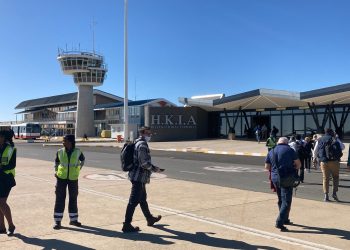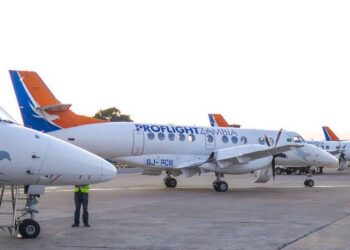
Tourism played a significant role in Namibia’s economy in 2022, generating N$14.3 billion accounting for 7% of GDP, a new Tourism Satellite Account (TSA) report says.
According to the Ministry of Environment, Forestry and Tourism Director for Tourism and Gaming, Sebulon Chicalu, the revenue was generated due to 527,610 inbound visitors.
“The majority of these visitors of over 421,000 were categorised as being on holiday, leisure or recreation, making a contribution of N$12 billion (81%) while N$1 billion was spent by those who travelled to visit friends and families. While those on business trips and transit spent N$932.3 million and N$145.8 million, respectively,” he said.
The TSA capacity building project was commissioned on 19 May 2022, and serves as a statistical framework used to analyse the economic contribution of tourism to a country or region.
It further helps in systematically measuring the impact of tourism on the economy by providing detailed information on the various components of tourism expenditure, employment, and other relevant indicators.
This includes direct contributions related to spending on accommodation, and transportation, as well as indirect such as supplier industries; and induced effects that deal with expenditure of employees in the tourism sector.
“Thus, tourism is not just about travel and leisure, but the sector is a vital economic driver of the Namibian economy that contributes significantly to the national GDP through job and employment creation, foreign currency earnings, skills development, and overall economic and social development,” Minister of Environment, Forestry and Tourism Pohamba Shifeta said while launching the report on Thursday.
Shifeta said Namibia TSA is based on the framework developed by the United Nations World Tourism Organisation (UNWTO), hence its implementation anchored under Strategic Intervention Four of Namibia’s Tourism Sector Recovery Plan (2022-2024), which aims to “increase tourism market intelligence through statistics and data collection.â€
“The finalisation of the 6th edition of TSA takes us closer to achieving the above goals and objectives. Also, this contribution by the tourism sector is commendable considering the negative impacts of the COVID-19 pandemic on the global industry in 2020 and 2021, respectively.”
“It was scientifically established through this process that tourism benefits other sectors and industries. With the launch of this report, policymakers, industry stakeholders, researchers, and the public at large will now have access to robust data that can guide strategic planning and policy formulation in the sector,” he stated.
Meanwhile, the United Nations Economic Commission for Africa’s Chief of Section: Inclusive Industrialisation, Olayinka Bandele, revealed that Namibia’s tourism sector in 2022 generated 57,571 jobs directly, accounting for 7.9% of total employment.
“This signified an improvement from 2021 when the sector created 29,000 jobs directly, which stood at approximately 3.9% of total employment,” said Bendele.
“These figures speak to the strength and increasing potential of the sector for the country’s sustainable growth, as tourism methodologies and empirical research point to the indirect multiplier effects of the tourism sector.
“Some global researchers note contributions up to 0.4 the amount of direct jobs; that is potentially for every 10 jobs created in the tourism sector, results in an additional four jobs created indirectly in other sectors, such as transport, logistics, construction, arts and entertainment, etc. In addition, we must be cognisant of the importance of the tourism sector for employment and income generation for women and youth, and as a source of economic diversification, particularly in remote, rural areas,” she reiterated.
United Nations Resident Coordinator, Hopolang Phororo, said developing the Tourism Satellite Accounts is a complex process that requires a collaborative approach bringing together key stakeholders and institutions for a functional TSA.
The report has increased the availability of tourism data and statistics on tourism demand, supply and employment, as well as enhancing awareness of tourism as a driver for economic development and poverty alleviation, she added.











